Schengen Area takes Switzerland on board
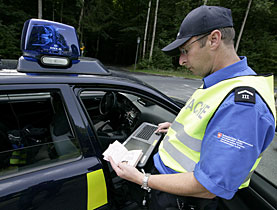
Switzerland's official entry into the Schengen zone is set to bring closer cooperation than ever before with the European Union on police and asylum matters.
On Friday – the day of accession – Justice Minister Eveline Widmer-Schlumpf will meet Schengen experts from the EU in Basel, on Switzerland’s northern border.
A larger celebration – at ministerial level – is planned at the end of March when Switzerland’s airports are integrated into the Schengen accords.
In short, the Schengen accords deal with the abolition of systematic passport controls among the participating countries.
There was much more enthusiasm a year ago when eight eastern European countries and Malta entered the Schengen Area. Politicians and crowds of people celebrated in style with confetti and fireworks as the border posts disappeared.
For many east Europeans, travelling in the Schengen area without passport controls was the final victory against the Iron Curtain.
But there will be no great changes at Swiss borders on the official entry into Schengen.
“Customs control remain”
“Customs controls will remain so Switzerland’s entry into Schengen will not have the same symbolic meaning,” said Catherine Kropf at the Swiss justice and police ministry.
Since Switzerland is not a member of the EU’s customs union, there will be no changes for goods entering the country.
For example, Schengen will not change the amount of red wine that people can bring into Switzerland from France, and customs controls will remain.
Systematic controls of passports and identity cards at border crossings will be lifted but they will be replaced by random checks within border regions and in international trains.
But this is not really new territory for the Swiss either since Swiss border guards have been carrying out mobile border controls for some time.
Schengen will bring most changes for the police, which can now use the Schengen Information System data bank, although this was already introduced provisionally in August.
“Extremely positive”
The justice and police ministry describes the first trials with the SIS as “extremely positive”. Swiss police officers and border guards were confronted with an average of 30 so-called hits in the database.
In the first 100 days of trials, they found 900 names, mainly of foreigners not permitted to enter the Schengen Area. A large majority were about stolen cars or false bank notes.
There were only 25 concerning people sought for arrest by other countries.
SIS will be replaced in future by a much more efficient database known as SIS II, in which, for example, fingerprints can be stored.
A system already using fingerprints is Eurodac, which contains information on asylum seekers and people who have entered a country illegally. Switzerland will be hooked up to Eurodac on December 15. The EU is also working on a database for visa requests.
Data protection
These systems, which form the core of Schengen, mean a much heavier burden for data protection authorities of both the state and the cantons. They have to ensure that the rights of people registered are protected.
Experts from Schengen states said earlier this year that data protection in Switzerland was adequate but warned that it should be strengthened and become more independent.
Switzerland will also become a member of the EU’s Dublin accord on asylum on December 12.
This is designed to clarify the country responsible for asylum seekers. As a general rule, someone seeking asylum is required to apply in the member state first entered. Such a system has advantages for a land-locked country like Switzerland because it is surrounded by other Dublin accord members.
swissinfo, based on an article in German by Simon Thönen in Brussels
The following rights apply to the Schengen Information System:
Information: If a person suspects he is registered in the SIS, he can demand access to the information.
Correction: If incorrect or improper data has been entered into the system, an individual can demand a correction or deletion of the entry.
Appeal: If information or a correction is refused, an individual can make an appeal or demand a check by the data protection authorities.
Compensation: A person has the right to compensation if he or she suffers a loss as a result of information registered or used in contradiction to the rules concerning handling of information in the SIS.
As a member of the Schengen Area, Switzerland has to take on EU laws applicable to Schengen and Dublin. Bern negotiated one exception – references to banking secrecy.
Since the signing of the Schengen treaty in 2004, the EU has officially passed on 71 new laws to Switzerland on the issue.
A referendum has only been initiated against one issue – the introduction of passports with fingerprints. It will go to a nationwide vote in Switzerland on May 17.
Another change is likely to be controversial: Switzerland will have to shorten the maximum length of detention pending deportation from 24 months to 18.

In compliance with the JTI standards
More: SWI swissinfo.ch certified by the Journalism Trust Initiative
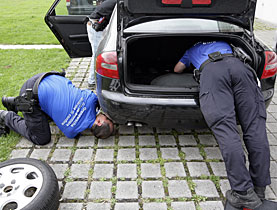
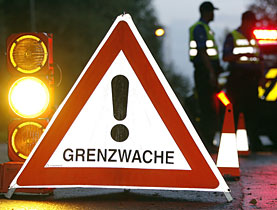
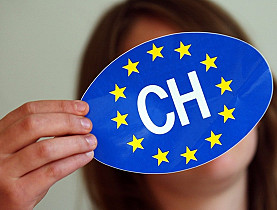
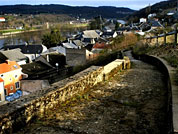
You can find an overview of ongoing debates with our journalists here. Please join us!
If you want to start a conversation about a topic raised in this article or want to report factual errors, email us at english@swissinfo.ch.